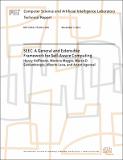| dc.description.abstract | Modern systems require applications to balance competing goals, e.g. achieving high performance and low power. Achieving this balance places an unrealistic burden on application programmers who must understand the power and performance implications of a variety of application and system actions (e.g. changing algorithms or allocating cores). To address this problem, we propose the Self-aware Computing framework, or SEEC. SEEC automatically and dynamically schedules actions to meet application specified goals. While other self-aware implementations have been proposed, SEEC is uniquely distinguished by its decoupled approach, which allows application and systems programmers to separately specify observations and actions, according to their expertise. SEEC s runtime decision engine observes the system and schedules actions automatically, reducing programmer burden. This general and extensible decision engine employs both control theory and machine learning to reason about previously unseen applications and actions while automatically adapting to changes in both application and system models. This paper describes the SEEC framework and evaluates it in several case studies. SEEC is used to build an adaptive system that optimizes performance per Watt for the PARSEC benchmarks on multiple machines, achieving results as least 1.65x better than a classical control system. Additional studies show how SEEC can learn optimal resource allocation online and respond to fluctuations in the underlying hardware while managing multiple applications. | en_US |
